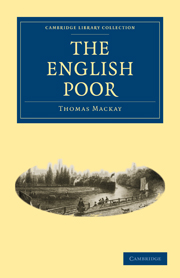Book contents
- Frontmatter
- PREFACE
- Contents
- CHAPTER I PROPERTY THE MAIN CONDITION OF SURVIVAL. THE GENERAL PROPOSITION STATED
- CHAPTER II THE SAME CONSIDERED HISTORICALLY. PRIMITIVE FORMS OF SOCIETY AND THE VILLAGE COMMUNITY
- CHAPTER III ENGLISH VILLENAGE
- CHAPTER IV THE BLACK DEATH AND THE DIVORCE OF THE LABOURER FROM THE LAND
- CHAPTER V THE INCREASE OF SHEER-FARMING, AND THE GROWTH OF A PROLETARIATE
- CHAPTER VI TOWN LIFE AND THE TRADE GILDS
- CHAPTER VII SOCIAL LEGISLATION AND THE POOR LAW
- CHAPTER VIII THE INDUSTRIAL REVOLUTION OF THE EIGHTEENTH CENTURY
- CHAPTER IX THE THEORY OF WAGES
- CHAPTER X PRIVATE PROPERTY AND POPULATION
- CHAPTER XI THE MODERN ASPECT OF THE POOR LAW
- CHAPTER XII THE POOR LAW, continued
- CHAPTER XIII INSURANCE A SUBSTITUTE FOR THE POOR LAW
- CHAPTER XIV SOME FORMS OF SOCIALISTIC LEGISLATION
- CHAPTER XV THE ETHICAL ASPECT OF THE QUESTION
CHAPTER X - PRIVATE PROPERTY AND POPULATION
Published online by Cambridge University Press: 29 August 2010
- Frontmatter
- PREFACE
- Contents
- CHAPTER I PROPERTY THE MAIN CONDITION OF SURVIVAL. THE GENERAL PROPOSITION STATED
- CHAPTER II THE SAME CONSIDERED HISTORICALLY. PRIMITIVE FORMS OF SOCIETY AND THE VILLAGE COMMUNITY
- CHAPTER III ENGLISH VILLENAGE
- CHAPTER IV THE BLACK DEATH AND THE DIVORCE OF THE LABOURER FROM THE LAND
- CHAPTER V THE INCREASE OF SHEER-FARMING, AND THE GROWTH OF A PROLETARIATE
- CHAPTER VI TOWN LIFE AND THE TRADE GILDS
- CHAPTER VII SOCIAL LEGISLATION AND THE POOR LAW
- CHAPTER VIII THE INDUSTRIAL REVOLUTION OF THE EIGHTEENTH CENTURY
- CHAPTER IX THE THEORY OF WAGES
- CHAPTER X PRIVATE PROPERTY AND POPULATION
- CHAPTER XI THE MODERN ASPECT OF THE POOR LAW
- CHAPTER XII THE POOR LAW, continued
- CHAPTER XIII INSURANCE A SUBSTITUTE FOR THE POOR LAW
- CHAPTER XIV SOME FORMS OF SOCIALISTIC LEGISLATION
- CHAPTER XV THE ETHICAL ASPECT OF THE QUESTION
Summary
It appears from the foregoing that the condition of the skilled artisan is in many respects a hopeful one; but it is chiefly hopeful in this, that with only moderate industry, intelligence, and thrift he has every chance of being not only a wage-earner but also a capitalist. At present, unfortunately, he cannot often obtain a share, such as will sweeten his toil, in the business where he is engaged; but other tenures of property have been invented—of these he has availed himself, and so much improved the security of his position. By means of his tradeunion he has established an equitable right to a share in enhanced profits. Coal-owners object, and object no doubt on sound economical grounds, that wages have nothing to do with profit; Still they submit, and submit willingly, to the arbitration of the sliding scale. The miner, through the trade association, has capitalised, not his labour, but his acquiescence to certain terms. The coal-owner accepts the position, and so relieves himself of a great anxiety and uncertainty. In this sense the miners' labour is capitalised, and in return for this the owners agree to increase wages when profits allow of it.
Insurance against sickness and death is another expedient for gaining the security of property. This has been much used by the more intelligent classes of workmen.
- Type
- Chapter
- Information
- The English Poor , pp. 176 - 192Publisher: Cambridge University PressPrint publication year: 2009First published in: 1889

